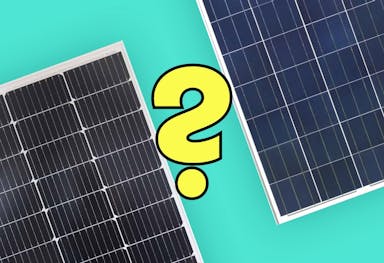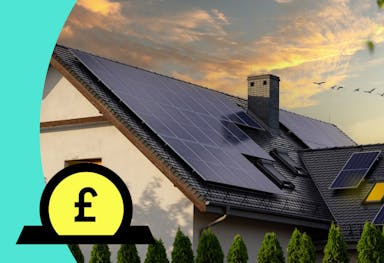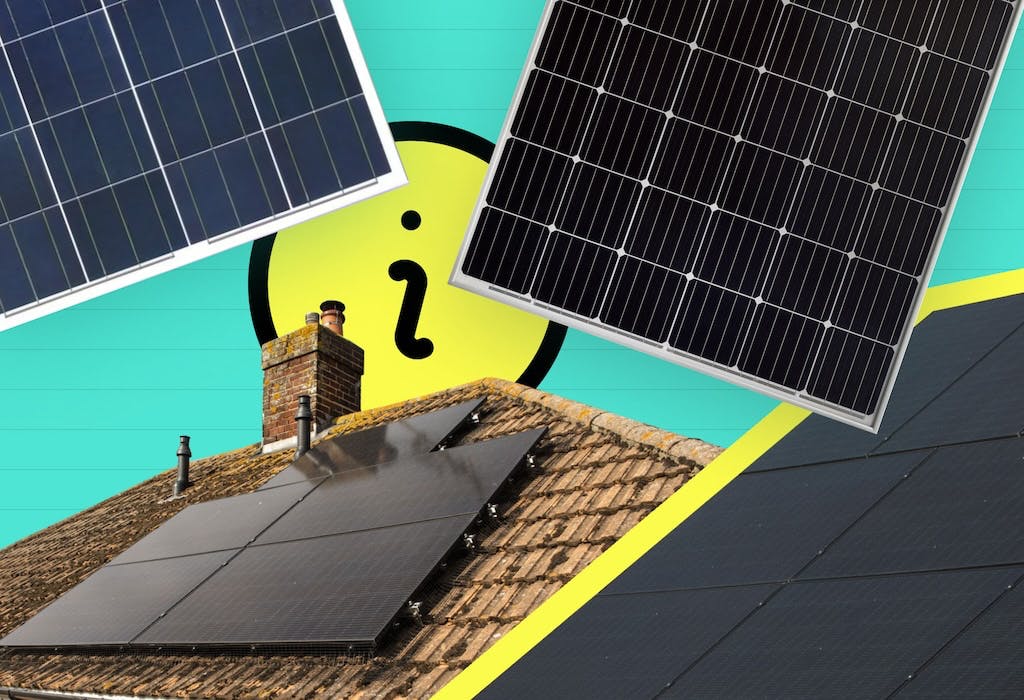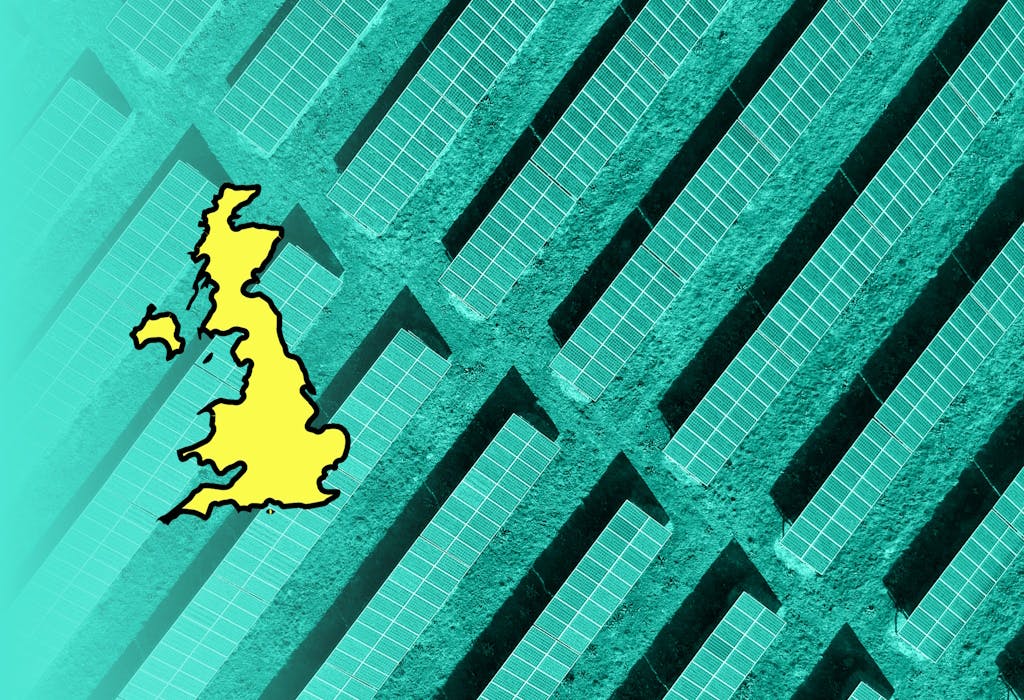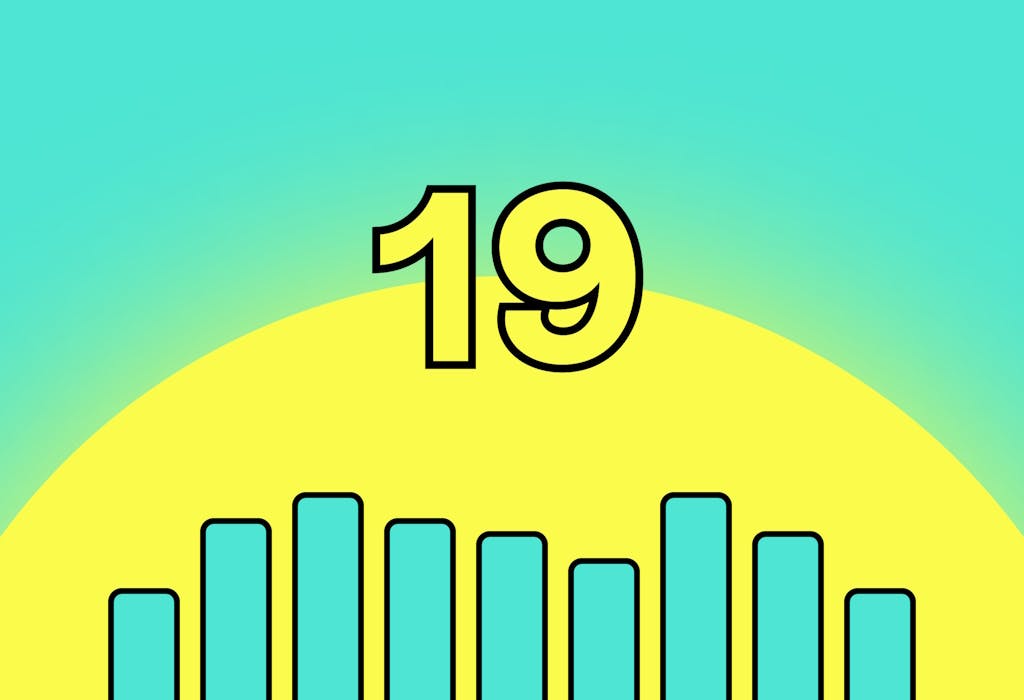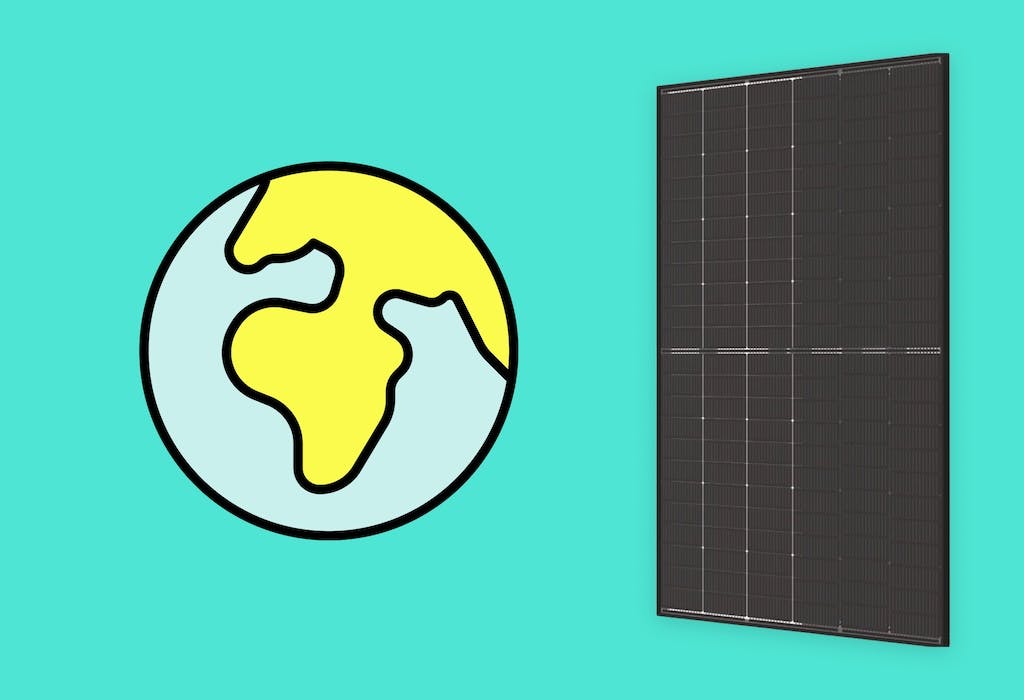- Solar advice hub
- Solar-energy
- The pros and cons of solar panels
The pros and cons of solar panels
Here are all the pros and cons of solar panels, plus how to make the most of your system while avoiding the biggest pitfalls.


Why you can trust our content
We know that the solar industry is full of misinformation, but we only use reliable sources, including:
- Our experienced solar experts, installers and system designers
- Our own database of solar & battery system designs
- Authoritative bodies like MCS and the UK government



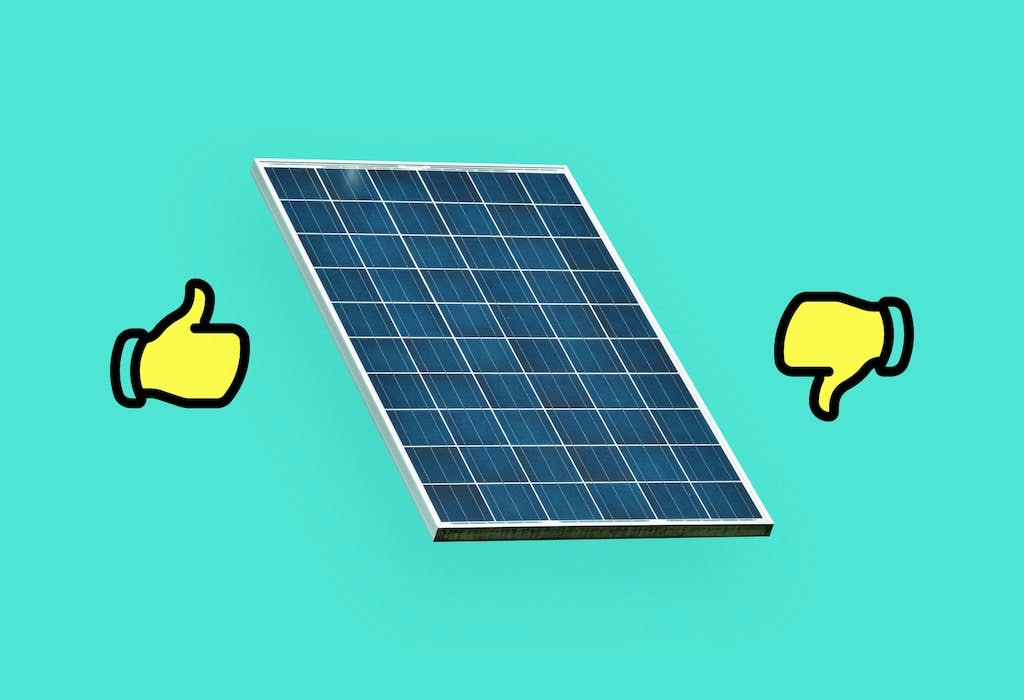
Calculate savings
What kind of home do you live in?
Calculate savings
What kind of home do you live in?
At a glance
It’s important to weigh up the benefits and drawbacks of getting solar panels, as you would before any home improvement.
As well as the financial elements, it’s also worth considering their environmental impact, how much they’ll add to your property’s value, and what the planning process will be like.
In this guide, we’ll run through all of these pros and cons and more – and explain how you can make the most of your system while avoiding the biggest pitfalls.
If you would like to see the savings you could get from a solar & battery system, answer a few quick questions below, and we’ll provide an estimate.
Find out how much you can save
What kind of home do you live in?
What are the advantages and disadvantages of solar panels?
Solar panels, like any source of energy, come with upsides and downsides.
Fortunately, there are many more upsides – as you’ll see below – and most households can easily avoid the downsides.
The upsides are also excellent – among the many positives, you can save hundreds of pounds per year, cut your carbon footprint, and potentially increase your home’s value.
The 13 pros of solar panels
There are numerous advantages to going solar, because it’s a source of free, green electricity that often lasts upwards of 30 years.
Here are all the best benefits to getting solar panels.
1. They’ll cut your electricity bills
Solar panels generate electricity that you can use in your home, which reduces the amount of electricity you have to buy from the grid. This cuts your electricity bills, and if you get a solar battery too, you can save even more.
On average, you could save 86% on your electricity bills with a solar & battery system.
This might sound too good to be true, but it’s all because of the high performance of modern solar panels and storage batteries, as well as export income. The panels will dramatically reduce the amount of electricity you buy from the grid, and you’ll also earn money by selling your unused electricity to the grid.
This is based on a sample of over 150 systems installed by Sunsave across England and Wales in 2024. The average system is 6.1kWp, with 54% of solar electricity used at home and 46% exported to the grid.
The electricity your system generates and stores can also power heat pumps and electric vehicles, which means you can use your panels to slash your heating and driving costs too.
Solar panels cost thousands of pounds if you pay upfront, so it’s only right that they substantially lower your energy bills.
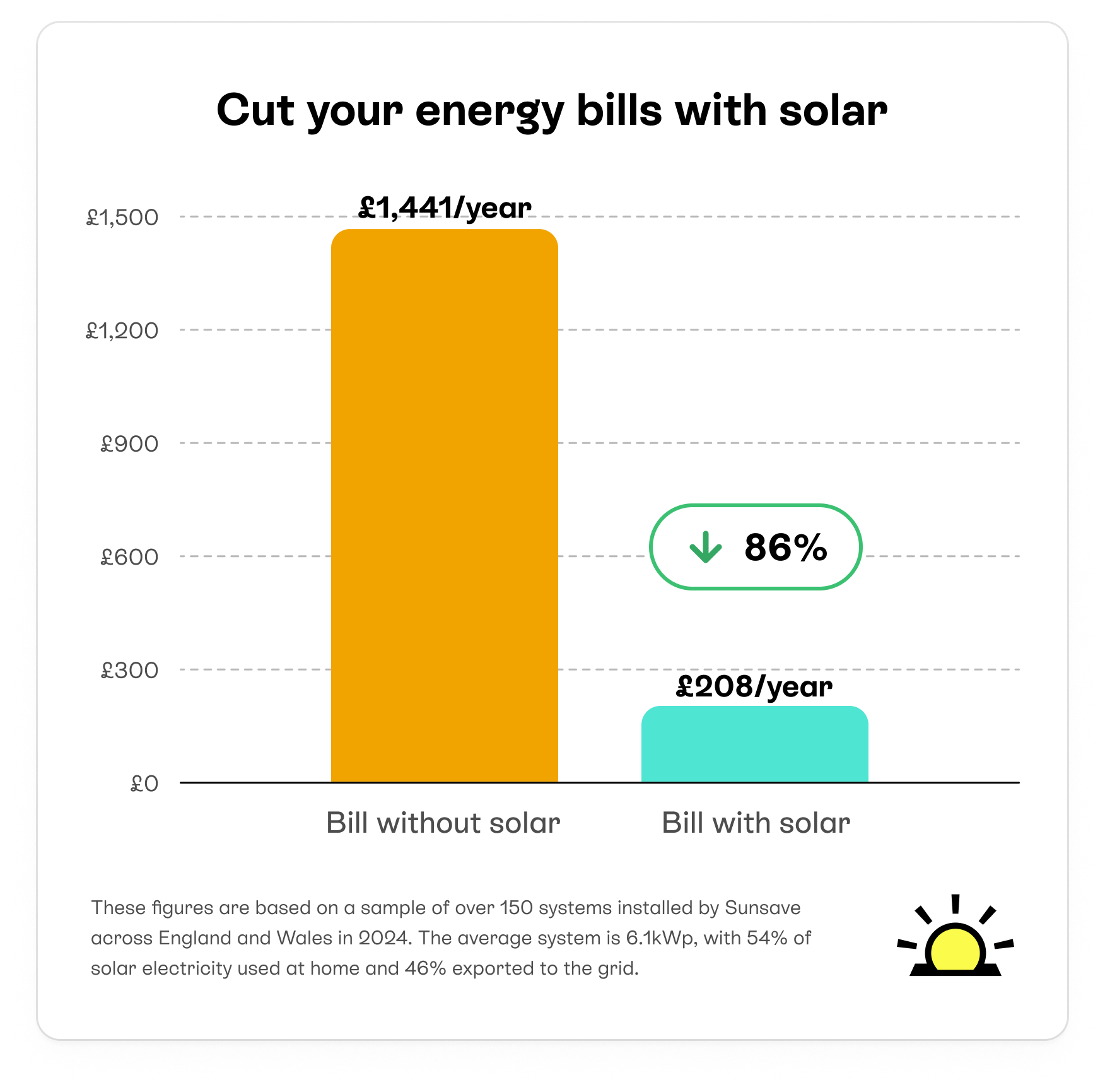
2. You can sell excess energy to the grid
You can earn hundreds of pounds per year by sending the excess electricity your solar panels produce to the grid.
There will be times, especially during summer, when your panels generate more electricity than your home can use and your battery can hold.
This electricity will automatically be sent to the grid – but if you sign up to a solar export tariff, you can gain some profit instead of giving it away for free. All the major electricity suppliers offer export tariffs – often called Smart Export Guarantee rates – but they vary enormously, from 1p per kilowatt-hour (kWh) to above 20p per kWh.
A typical UK household can earn £343 per year from exporting their excess solar electricity.
This figure is based on a home using 3,400kWh of electricity per year (which is the UK average ) with solar irradiance of 850kWh/kWp, a 4.6kWp solar PV system, and a 5.2kWh battery.
The home is signed up to Good Energy's Solar Savings tariff for export, Good Energy EV Charge for import, and exports 65% of its solar electricity.
To learn more about how much you can earn, check out our guide to the best export tariffs.
If you signed up to the Feed-in Tariff before it closed to new applications in 2019, you’ll still receive export payments from that scheme, unless you switch to an export tariff.
3. They reduce your carbon footprint
Solar panels are a clean and renewable source of energy, meaning they don't produce any harmful emissions.
By using solar panels, you can therefore reduce your carbon footprint and help the planet.
With a solar & battery system, your household’s carbon footprint will drop by around 1.1 tonnes of CO2 per year, on average - or 31%. This is based on a database of 32 different solar & battery systems designed by Sunsave, located across England and Wales. Each system in the database uses 430W solar panels and a 5.8kWh battery.
This will cut your annual household carbon footprint by 31%, as the average UK household's carbon footprint is 3.5 tonnes per year. This figure is based on a government report that households account for 26% of the UK’s carbon footprint , the country’s latest emissions total of 384.2 million tonnes , and the fact that there are 28.2 million households across the nation at the last count.
This drop is so dramatic because 49% of electricity from the grid is powered by fossil fuels , which contribute heavily to your home’s carbon footprint. By using less of it, you’re responsible for a lower rate of emissions.
4. You could benefit from government incentives
There are various solar panel grants available for certain households that want to go solar but can’t afford the upfront cost. These include:
- The Warm Homes: Local Grant. There are currently hundreds of local authorities in England providing up to £30,000 in home improvement funding to households that are energy-inefficient, deprived, low-income, or receive a means-tested benefit
- The Energy Company Obligation 4 (ECO4). Until 31 March 2026, this scheme will offer solar panels to electrically heated, low-income households with a vulnerable resident who receives a qualifying benefit
- 0% VAT on residential solar panel installations. This discount applies to all domestic solar panel system installations in the UK up to April 2027 – including standalone solar battery installations
Check out our free eligibility checker to find out if you're eligible for a solar panel grant.
Due to their stringent requirements, most households won’t be able to access these government incentives. If that includes you, Sunsave Plus may be the answer.
For a fixed monthly fee, our subscription service will provide an all-in-one solar and battery solution that’s tailored to your home, at no upfront cost.
It also comes 24/7 monitoring and maintenance, free replacement parts (including a battery and inverter), downtime cover, and insurance against damage, fire and theft.
Answer a few quick questions below to sign up for Sunsave Plus, and we'll be in touch.
Find out how much you can save
What kind of home do you live in?
5. They work all year round
Solar panels generate electricity on every day of the year, in all conditions.
Their output peaks in summer – when you’ll be able to earn lots of money by exporting electricity to the grid – and is lowest in winter.
But even during these darkest months, they’ll still cut your electricity bills.
If you add a solar battery, you can get the most out of the electricity your system produces throughout the year, either by using it in your home or selling it to the grid.
If you're wondering whether a battery would be right for your home, check out our guide to whether solar batteries are worth it.
The chart below shows how a 6kWp solar panel system’s output levels vary across a typical year, as well as the fluctuating consumption patterns of a household that uses 4,000kWh of electricity each year.
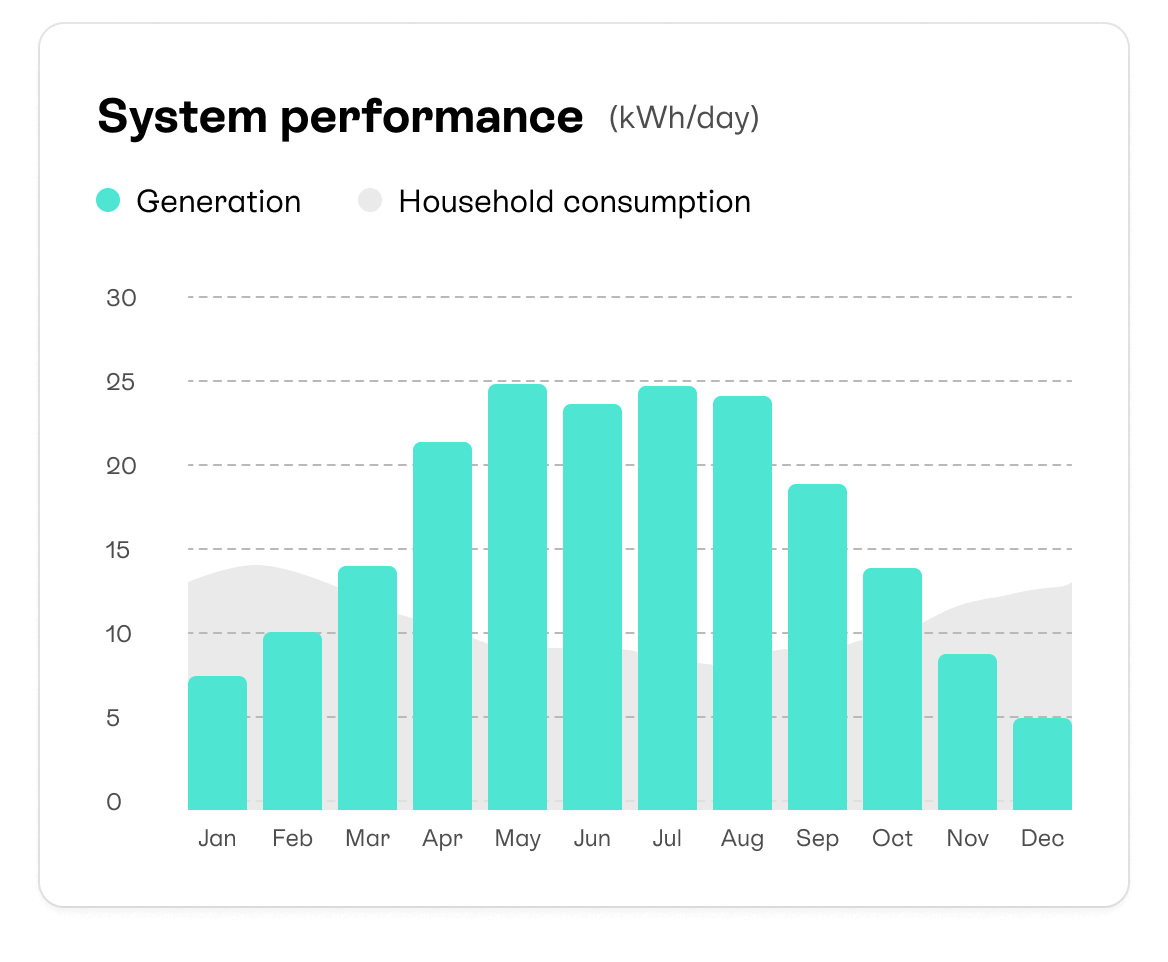
6. You can recover your investment
Your upfront cost may be steep, but if you get a well-sized system for your home, you should make your money back over time.
You’ll recoup your outlay by importing less electricity and selling your excess electricity to the grid, allowing you to break even on your initial investment in just over eight years, on average.
This is based on a sample of over 150 solar & battery systems installed by Sunsave across England and Wales in 2024. The average system size is 6.1kWp, with 51% of solar electricity used at home and the other 49% exported to the grid, on average.This means that for the great majority of households, solar panels are worth it.
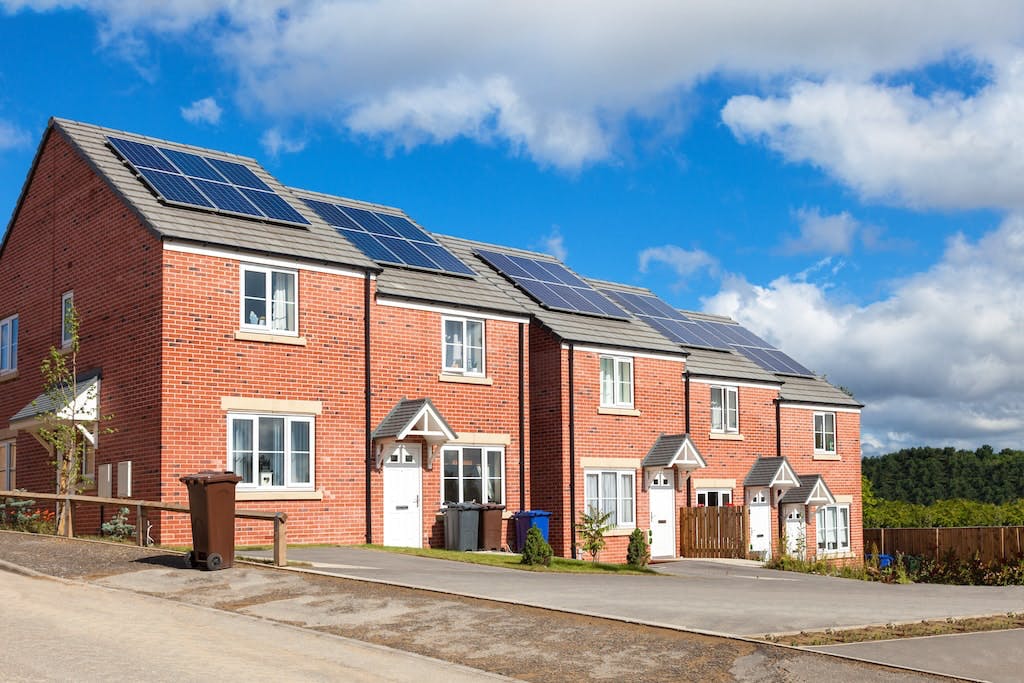
7. They can increase your home’s value
Solar panels can increase the value of your home by 3%, according to a study by Rightmove in 2023.
They achieve this level of growth by raising your property’s Energy Performance Certificate (EPC) rating – an energy efficiency grade between A and G that can be seen by all potential buyers.
Solar panels raise a home’s EPC rating by 18 points on average – a whole grade – according to our calculations, which are based on the government’s Standard Assessment Procedure (SAP) guidance.
This will allow you to make as much as £10,000 more from selling your property, according to the Sustainable Homes and Buildings Coalition.
8. You’re insured against rising energy costs
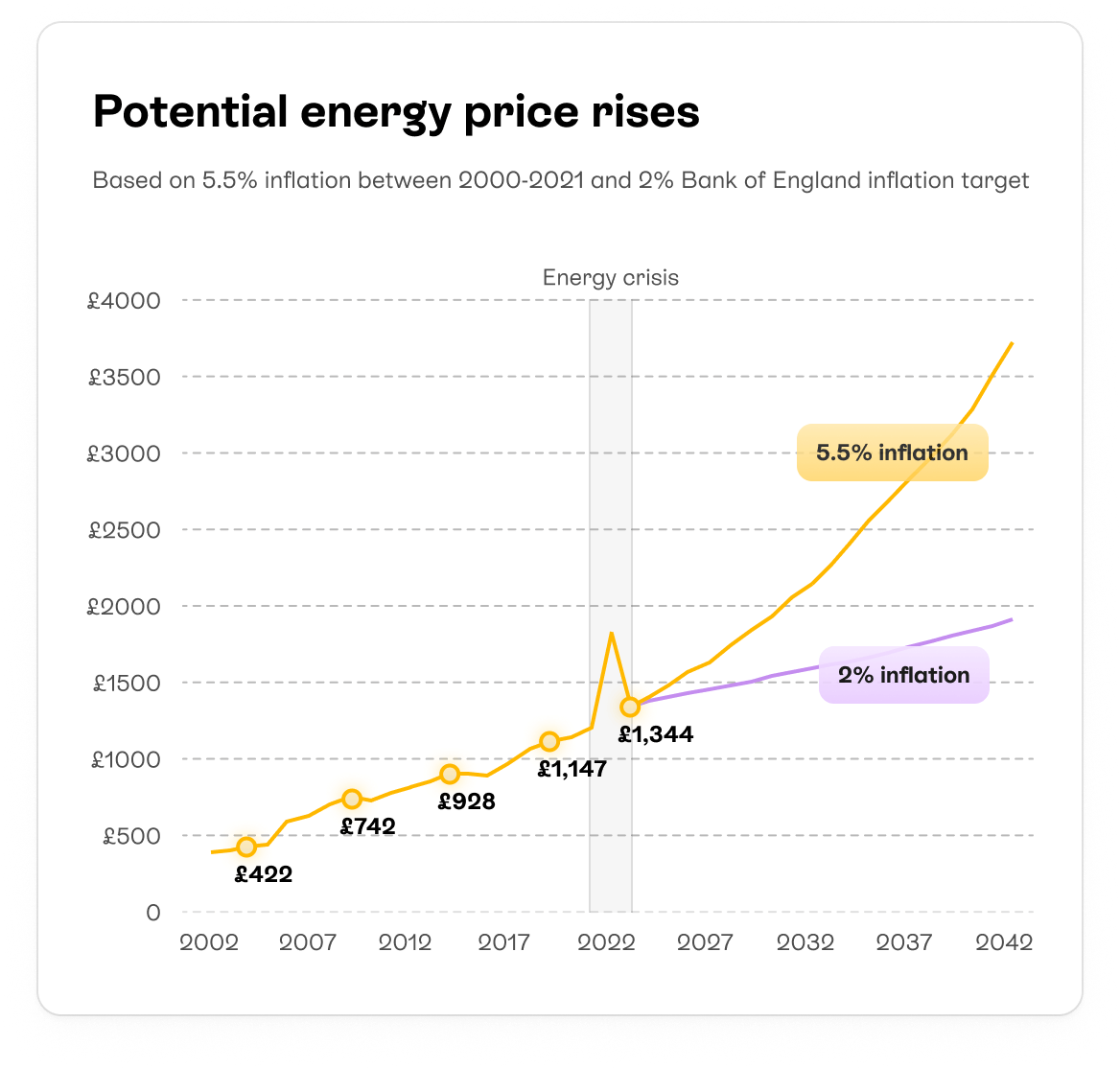
The cost of electricity is high now, and it may well rise further in the coming years.
It’s difficult to forecast the future, but past data from the UK government shows that between 2000 and 2020, electricity prices rose by 5.5% per year on average.
This steady increase was brought about by underlying inflation more than by changing wholesale values, which indicates that even if wholesale prices plateau or fall at some point, the cost of your energy will probably still grow at a similar rate over the next two decades.
Solar panels can cushion this blow by lowering your costs and providing you with excess electricity to sell to the grid.
9. They are self-cleaning
Modern solar panels are manufactured with a hydrophobic coating, which means rainwater rolls right off them.
In the UK, this happens fairly often, which stops dust and dirt from building up on the surface of your system and reducing its output.
Of course, if you take the rainy weather away, solar panels aren’t self-cleaning, but this is only a problem in dusty, arid places – not the UK.
To learn more, check out our guide to solar panel maintenance.
10. They work with EVs and heat pumps
As electric vehicles and heat pumps become the norm, household electricity usage is set to spiral upwards.
The government is aiming for fully electric vehicles to make up 80% of new car sales by 2030, as their popularity continues to grow unabated.
Heat pump sales aren’t increasing quite as rapidly, but the Boiler Upgrade Scheme has ensured they remain on the rise, as the government attempts to meet its target of 600,000 sold per year by 2028.
As the UK gradually electrifies its heating and transport infrastructure, the country’s electricity consumption will grow by 50% between 2020 and 2035, according to consultancy firm McKinsey.
Fortunately, a solar & battery system can power both of these major additions to your life, massively reducing their running costs.
That way, you can use a large amount of electricity every year without paying through the nose.
This is unlike solar thermal panels, which some eco-conscious households consider, but are not compatible with other modern green tech.
11. You’re protected against blackouts
With a battery, solar panels can supply you with electricity during blackouts, protecting you against hours or even days of chaos and inconvenience.
As well as a battery, which most modern solar installations include, your installer will also need to give your system Emergency Power Supply (EPS) functionality, by setting up a relay that can physically disconnect your home from the grid when a power cut happens.
You can choose any level of EPS, from just power sockets to your whole home.
After they’re done, you’ll just have to set your battery’s minimum level, so you always have a certain amount of electricity available if the grid goes down.
This is less of an issue if a power cut happens during the day, since your solar panels can keep topping up your battery while it supplies electricity to your home.
12. They last a long time
Modern solar panels typically come with a performance warranty that guarantees a high level of output at 25 or even 30 years.
This means they can potentially keep generating substantial amounts of free electricity for decades after you break even – and in most cases, it’s a conservative estimate.
Monocrystalline panels, which are the sleek, black models that have become the most popular type of solar panel in the UK, are estimated to last at least 40 years when maintained properly.
For more information, check out our guide: how long do solar panels last?
13. You can recycle them
After 30 or 40 years – or longer – your solar panels will stop functioning completely. At this point, you can easily recycle them, for free.
Your installer is legally compelled to arrange for your solar panels to be collected and recycled under EU regulations, which still apply despite Brexit.
If your installer has gone out of business in the decades since they worked on your home, just get in touch with a service like PV Cycle, which will take your panels away and recycle them – again, for free.
Recycle Solar in Scunthorpe is currently the only recycling centre in the UK that’s run on an industrial scale, but more will inevitably be built in the coming decades as the market grows.
The five cons of solar panels
There are a few drawbacks to getting solar panels.
We’ll run through them below, along with the best ways to make sure they don’t impact your experience or stop you from getting solar panels in the first place.
1. They have a high upfront cost
The cost of solar panels is high if you pay upfront, with the average currently standing at £11,307 for a typical three-bedroom household.
This includes the cost of a 4.5kWp solar panel system, 5kWh battery, inverter, and installation.
However, it doesn’t have to be this way. We’re offering the UK’s first solar subscription, so you can have panels installed at no upfront cost, and start saving on your electricity bills from day one.
Without a service like Sunsave Plus, solar panels are still out of reach for most people, with half of UK households holding less than £5,000 in savings.
2. Some properties aren’t suitable
Most properties are suitable for solar panels, but some won’t benefit enough to make it worth it.
If your only usable roof is north-facing, it’ll be trickier to build a profitable system, especially if you also live in one of the northernmost areas of the UK.
You can get a ground-mounted system or an installation on a flat roof, but you’ll face higher costs and have to jump through planning permission hoops that most properties will avoid.
Installing solar panels on a flat, a listed building, or in a conservation area also comes with a more complicated planning permission process – but it’s far from unachievable.
If your home has vaulted or profiled ceilings, they may not be suitable, as your installer will need loft space that allows them to safely access the underside of the roof.
And if your roof is subject to unavoidable shading all day, every day, a solar panel system wouldn’t work for your property.
To learn more, check out our guide to north-facing vs south-facing solar panels.
3. They work less well in winter
Solar panels generally function less well when the days are shorter and darker, so your system will likely produce less electricity in winter than at other times of the year.
However, solar panels do still work in winter, with modern installations designed to function at temperatures as low as -30°C.
The chart below shows that the average system will generate around 11% of its annual total during winter, in stark contrast to the 38% it’ll produce in summer.
This works perfectly well though, especially if you get a solar battery and sign up to a solar export tariff. You can make the most of the electricity your panels produce in winter, and sell the excess in summer.
Over the entire year, with a solar & battery system you can cut your electricity bills by 86% on average – so the seasonal variations in your generation levels won’t hurt your overall savings.
4. There are firm installation requirements
There are several non-negotiable requirements when it comes to solar panels, which somewhat limits the number of people who are able to buy them.
You must:
- Own your home (unless you get permission from your landlord)
- Have a large enough roof that isn’t totally shaded
- Get planning permission for a ground-mounted system, listed building, or in a conservation area
- Make sure your installer complies with all building regulations – or they could be removed and you could receive an unlimited fine
5. They require maintenance
Some technical experts in the industry estimate that a solar & battery system in the UK will need three maintenance call-outs across a 20-year period - one for the panels, one for the battery, and one for the inverter.
In a Which? survey from 2022, solar owners reported experiencing electrical problems, generation meters breaking, panels producing less electricity, panels producing no electricity, weak electrical connections, cracked/broken glass on panels, and isolator problems.
All of these issues require you to find a reliable, affordable installer who understands how the system works well enough to fix it.
A government study from 2021 showed that 55% of people in the UK who don’t want (or aren’t sure about) solar panels said maintenance concerns were a key reason.
40% reported that a guarantee scheme would allay these concerns, and fortunately, we’ve created the Sunsave Guarantee – which comes with Sunsave Plus – to do exactly that.
The Sunsave Guarantee ensures that if any part of your system stops working or even drops below an acceptable performance level over your 20-year subscription, we’ll come and fix it.
You can get a free battery replacement as soon as it performs at less than 70% of its original capacity – which typically happens after 10-12 years – and a free inverter replacement, whenever it’s required – which is usually around the same time.
We’ll monitor your system 24/7, alert you if anything goes wrong, troubleshoot the issue, and compensate you for any extended period that your system isn’t working as it should.
Your system will also be insured by Aviva against damage, fire, and theft.
To learn more, check out our guide to how long solar batteries last.
Next steps
Solar panels have many more benefits than drawbacks – and most of the disadvantages are either resolvable or not particularly impactful.
The upfront cost and maintenance requirements are typically the biggest obstacles, but fortunately, both of these concerns can be solved with Sunsave Plus.
Answer a few quick questions below to sign up for Sunsave Plus, and we'll be in touch.
Find out how much you can save
What kind of home do you live in?
Solar panel pros & cons: FAQs
Related articles

Written byJosh Jackman
Josh has written about the rapid rise of home solar for the past six years. His data-driven work has been featured in United Nations and World Health Organisation documents, as well as publications including The Eco Experts, Financial Times, The Independent, The Telegraph, The Times, and The Sun. Josh has also been interviewed as a renewables expert on BBC One’s Rip-Off Britain, ITV1’s Tonight show, and BBC Radio 4 and 5.



